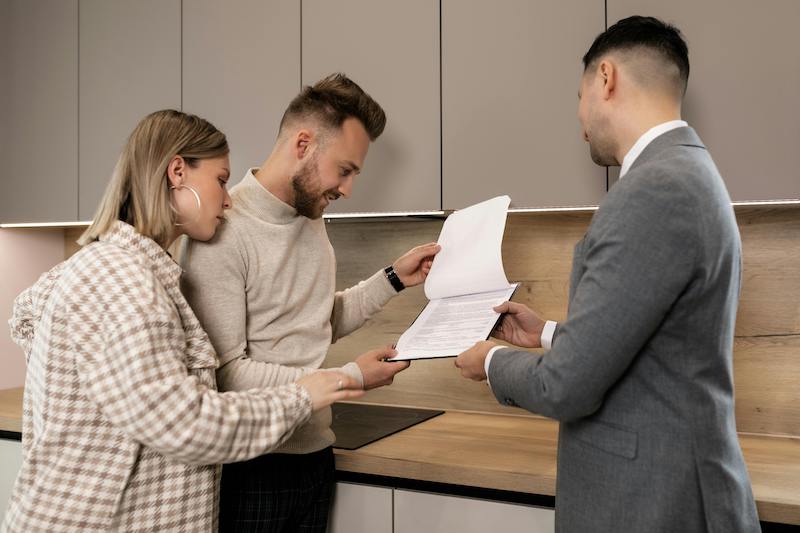Questions to Ask a Real Estate Agent: A Homeowner’s Guide
Buying or selling a home is a big deal—probably one of the biggest financial decisions you’ll ever make. So, picking the right real estate agent? Yeah, that’s pretty important too. But how do you make sure you’re choosing the right one? It all starts with asking the right questions.
Think of it like dating. You wouldn’t jump into a long-term commitment without getting to know the person, right? The same goes for real estate agents. You want to make sure they’re the perfect match for your needs, your goals, and your style of communication. After all, they’re going to be your partner in this exciting (and sometimes stressful!) journey.
So, whether you’re buying your first home or selling your long-time family house, here are the questions you need to ask when you’re interviewing real estate agents.
1. Experience and Track Record
First things first, let’s talk experience. You don’t want to hand over something as major as your home to just anyone, right? Asking about an agent’s experience is a great starting point to make sure you’re in good hands.
Start by asking:
“How long have you been working as a real estate agent?” and “How many homes have you helped buy or sell in the last two years?”
These questions help you gauge their experience level, but also see how familiar they are with the current market. The market changes all the time, so you want someone who’s not only experienced but also up-to-date.
But here’s the thing—it’s not all about the years. You might find an agent who’s only been in the business for a few years but has an impressive track record because they hustle and stay on top of trends. It’s about quality and quantity. Also, ask about recent success stories in your area. If they’ve closed deals similar to what you’re looking for, that’s a good sign.
2. Local Market Knowledge
Next up, let’s dive into how well they know the local area. Real estate isn’t just about homes—it’s about the neighborhoods, the schools, the best coffee spots, and even where that pesky rush-hour traffic hits the hardest. You want an agent who’s a local expert, someone who really knows the ins and outs of the area you’re looking at.
Ask them:
“What do you know of this neighborhood?” and “What do you know about market trends in this area?”
You want an agent who knows the community like the back of their hand. If you’re buying, they should be able to tell you which areas are up-and-coming, where you can get the best value, and even the little things like the best walking trails or nearby parks. If you’re selling, they need to know the local market so well that they can set a competitive price for your home and target the right buyers.
Ask them about recent sales in the neighborhood and dive deeper. Agents who live or work locally often have a better pulse on the market and can offer more personalized advice, such as information about the best schools or where to get a great cup of coffee.
Knowing the local schools, restaurants, and even upcoming community events? That’s just icing on the cake and a good sign they’re not just about the sale—they truly get the area.
3. Experience and Track Record
When you’re hiring a real estate agent, experience really counts. Think of it like this: Would you give your beloved car to a brand new mechanic or a seasoned pro that’s been fixing engines for years? Real estate is no different. You want someone who’s been through the process many times and knows how to navigate all the twists and turns that can pop up.
Ask them:
“How long have you been a real estate agent?” and “Do you have any examples of homes you’ve sold that are similar to mine?”
The goal here is to determine just how long they’ve been in the game and how good they are at their job. A good follow-up question could be to ask how many homes they’ve helped buy or sell in the last year. Real estate is a fast-changing industry, so even if they’ve been working for a decade, it’s important they’ve had a fair amount of recent experience.
You also want to ask for examples of homes similar to yours that they’ve sold. This will give you an idea of whether they’ve worked with properties like yours, in your price range, and in your area. If you’re selling a condo in the city and all their experience is with rural properties, it might not be the best match. Or if you’re buying a first home and they usually deal with luxury estates, that’s worth considering too.
Another great question is: “What’s your average time on the market for the homes you sell?” It’s not just about how fast they sell homes, but also whether they’re skilled at pricing homes realistically and negotiating effectively to get the best deal.
4. Local Market Knowledge
The local market can make all the difference when buying or selling a home, so it’s important to research it. Your real estate agent is your personal tour guide through the neighborhood, guiding you around school districts, property values, and even things like commute times. This is especially important if you’re moving to a new area and need someone who knows the ins and outs.
Ask them:
“How familiar are you with this neighborhood?” and “What are the local market trends right now?”
These questions are key because, let’s face it, every real estate market is different. You want an agent who knows what’s going on locally, not just someone who can look up facts on Zillow. A great agent will know if homes in your area are selling like hotcakes or if buyers have the upper hand. They should also be able to tell you whether property values are trending up or down, and what kinds of homes are in demand.
Here’s a follow-up question: “Can you share insights on what buyers in this area are looking for?” If you’re selling, this will help you know what features to highlight. If you’re buying, it gives you an idea of what you might be competing against.
Also, don’t be afraid to ask a potential seller, “Do you live in the area?” or “How long have you worked in this neighborhood?” When agents live or work in the local area they tend to have a better pulse on the market and can give a more personalized service, like where to find the best schools or get a great cup of coffee.
5. Pricing Strategy
Pricing is one of the most important parts of the process when you’re buying or selling, so make sure to get it right. An agent’s ability to help you navigate pricing can save you thousands, or ensure you get top dollar for your home.
Ask them:
“For sellers: How do you determine the listing price for a home like mine?”
“For buyers: How do you help me make a competitive offer?”
For sellers, the agent should explain how they’ll price your home based on comparable properties (or “comps”) in your area. The goal is to find that sweet spot where your home isn’t priced too high to scare off buyers, but not too low that you leave money on the table. Ask them how they adjust for unique features or flaws in your home compared to the competition.
For buyers, the pricing conversation is just as important. A good agent will help you figure out a competitive offer without overpaying. Also ask if they have experience negotiating in competitive markets. It’s not always about the price; sometimes it’s about other terms of the offer such as contingencies or closing dates.
And, here’s a bonus question for both buyers and sellers:
“Where are you seeing price trends in the current market?”
It will help you understand whether prices are going up, down, or staying the same, and what that means for what you should do next.
6. Marketing Strategy
If you’re selling your home, you want an agent who knows how to showcase it in the best possible light. The right marketing strategy can make all the difference in how quickly your home sells and at what price.
Ask them:
“What will you do to market my home to potential buyers?”
A good real estate agent will have a well thought out marketing plan that includes more than just listing your home on MLS (Multiple Listing Service). They should be able to explain what they’ll do to get attention, such as professional photography, virtual tours, social media campaigns, open houses, and email marketing.
It’s also worth asking:
“What’s your experience with online marketing?”
In today’s digital world, your agent needs to know how to use online platforms. Buyers are scrolling through Zillow and social media before they ever step foot in a home, so ask your agent how they plan to make your listing stand out online. Do they use paid ads? Do they have a strong presence on platforms like Instagram or Facebook?
For buyers, marketing might not seem as relevant, but you can still ask:
“How do you stay informed about new listings?”
It’s important to know how quickly your agent will be able to spot new homes that match your criteria and how connected they are in the local market.
7. Handling Offers and Negotiations
When it comes down to crunch time—whether you’re buying or selling—you want an agent who knows how to negotiate the best deal possible. Real estate negotiations can be difficult and working with an experienced agent is a good way to see the results you want.
Ask them:
“What do you do with offers and negotiations?”
For you as the seller, this means that you need to understand how your agent will handle multiple offers, counter offers and tricky buyer requests. A good agent should be able to walk you through their process and explain how they balance getting you the best price while keeping the deal moving forward.
You should also ask:
“What’s your strategy for negotiating?”
A great agent knows when to push and when to compromise, and they should be able to explain their approach clearly. Do they have experience in tough negotiations? How will they keep you informed during the process?
For buyers, it’s important to know:
“How do you handle bidding wars?”
In a competitive market, you need a skilled negotiator.. Ask your agent how they’ve helped previous clients win in competitive situations without overpaying.
8. After the Deal: What Happens Next?
Once the paperwork is signed and the deal is closed, your relationship with your real estate agent shouldn’t end there. A great agent will continue to be a resource for you even after the sale.
Ask them:
“What support do you offer after closing?”
Whether you’re a buyer or a seller, you might have questions that pop up once the deal is done. A good agent is part of a connected network, in touch with reliable contractors, designers, any anyone else who can help with renovations, property management or future investments.
Bonus question for sellers:
“What do you do after the sale?”
Sometimes, after the sale, things come up — a repair issue, or a snag with the buyer. It’s worth asking how your agent handles any issues that come up after the deal is finalized.
Conclusion
Hiring the right real estate agent can make or break your home buying or selling experience, so don’t be shy about asking the tough questions upfront. With these key questions in hand, you’ll be ready to find an agent who not only meets your needs but is also someone you can trust throughout the entire process.
At RemoteBuilder, we’re here to make your renovation and real estate journey as smooth as possible by connecting you with vetted professionals who have your back at every step. Got more questions? We’re always here to help!



